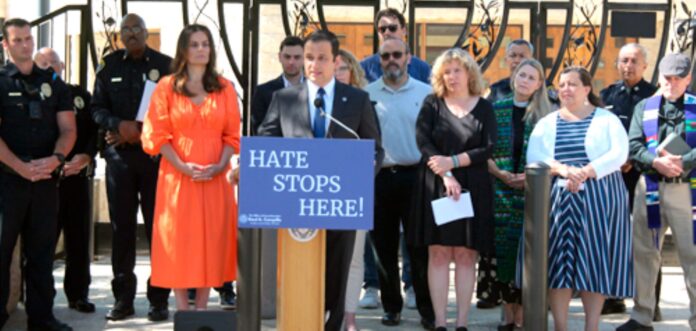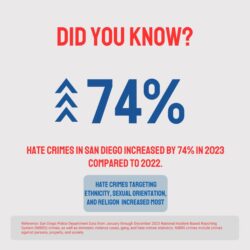
In recent years, places of worship, schools, and reproductive healthcare facilities have become focal points for hate and harassment. Each of these locations, known as “covered facilities” is associated with its own rhetoric of hate and political division. An unprecedented amount of threats and hate incidents have intensified at places of worship, particularly synagogues and mosques. Schools have become battlegrounds in culture wars, often involving book-banning controversies. And, reproductive healthcare facilities, meanwhile, have become central to the debate on abortion rights.
Extending beyond physical locations, another uptick in such patterns has been seen in what is known as “hate littering”, or distributing flyers, posters, or symbols with hateful messaging targeting protected communities.
“These are not just pieces of paper with words,” said Assemblymember Chris Ward (D-San Diego). “These are deliberate, targeted attacks that are intended to harass and intimidate victims, dehumanizing them based on their religion, gender, or sexual orientation. They are being left on our windshields, in our driveways, and on our front doors. They have no place in our communities,” Assemblymember Ward said.
Hate crimes and related incidents are an escalating problem in this region. In fact new data shows that between 2022 and 2023 hate crimes increased by a staggering 73%. In an effort to safeguard residents, multiple San Diego representatives have introduced fresh bills and initiatives designed to shield locals from forthcoming instances of hate and harassment within their community.
Local Hate Littering Ordinance Off to Sacramento

Assembly bill 3024 has been in the works since Sept. 2023, when District 7 Councilmember Raul Campillo brought forward an ordinance to the City Council to address the prevalence of antisemitic flyers found on car windshields. According to the Anti-Defamation League this occurred about eight times in San Diego in 2023; distributed in neighborhoods such as Allied Gardens, Del Cerro, and San Carlos. Across the nation, the organization found that in 2023 there were more than 3,600 antisemitic acts of assault, vandalism, and harassment in the United States.
While overall crime has decreased, hate crimes in San Diego targeting ethnicity, sexual orientation, and religion increased exponentially. Incidents against a person’s ethnicity rose by 53% compared to last year. Meanwhile, sexual orientation and crimes against religion both rose by 11%.
With hate flyers plaguing Councilmember Campillo’s District specifically, his action in proposing the ordinance has since moved up the chain to Sacramento, where Assemblymember Chris Ward has taken on the initiative through Assembly Bill 3024 in hopes to provide a safeguard for all Californians.

The next move for the Stop the Hate Littering Act will be to go in front of the Assembly Judiciary Committee in early April.
provider: youtube
url: https://www.youtube.com/live/imBUwE1ujks?feature=shared&t=176
src: https://www.youtube.com/embed/imBUwE1ujks?start=176&feature=oembed
src mod: https://www.youtube.com/embed/imBUwE1ujks?start=176
src gen: https://www.youtube.com/embed/imBUwE1ujks
City Attorney Mara Elliott Female Focused Proposal
“To anyone hoping to divide San Diego: You cannot do it; We will not let you; You will always end by bringing us closer together,” said City Attorney Mara Elliott.
While showing support for AB 3024, City Attorney Elliott has also been championing an initiative of her own. Her proposal, in honor of women’s history month, seeks to be the first major update to health care clinic access law this century, aiming to change the City of San Diego’s municipal code to further protect people entering covered facilities from harassment and intimidation.
Coming on the heels of the historic overturn of Roe. V Wade, San Diego has declared itself as a safe haven for women seeking reproductive services such as abortion. However, that has not come without an onslaught of threats and aggressive demonstrations pestering local healthcare providers, clinic employees, and patients on entrances and exits to clinic facilities.
“I have seen people be paralyzed in their cars with fear trying to get out and inside [Planned Parenthood]. One lady had a panic attack because of the fishbowl effect one receives when trying to get medical care,” said Planned Parenthood Volunteer and District 3 resident, Laura Libel.
Meanwhile, at the Planned Parenthood of the Pacific Southwest facility in Mission Valley “70% of patients and staff report feeling intimidated, threatened, harassed,” said Councilmember Campillo during the Public Safety committee meeting on March 20.
Eliott’s proposal also recognizes the importance of extending these safeguards to worship and education facilities.
Therefore, the proposed amendment aims to prevent the obstruction, harassment, and intimidation of people entering and exiting covered facilities. While preserving the fundamental constitutional rights of people to peacefully assemble and express opinions on matters of public concern.
Elliott’s proposal will build upon the City’s 1997 buffer zone regulations for covered facilities. Buffer zones establish an area around a specific location where speech and demonstration activities are subject to regulations not applicable outside the area. The city first enacted this regulation in an effort to balance often competing rights at covered facilities, which are:
- The right to medical privacy
- The right to to freely access to health care and educational services
- The right to freely to practice religion
- The right to freely freely exercise constitutionally protected speech
But, here is where our current laws fall short, Elliott says.
First, San Diego’s laws protecting access to Covered Facilities are burdensome. The current law requires demonstrators within the 100 foot buffer zone to withdraw 15 feet away from a person entering or exiting a covered facility; but only if the person asks the demonstrator to do so. According to Elliott, this imposes an “unreasonable burden” on the person seeking to access services within their protected right. In addition, the laws fail to address safety risks that may come from aggressive demonstrators attempting to block entrances and exits.
“No one should be afraid to see their doctor, learn, pray, or attend a school meeting,” said Eliott. The proposed updates would therefore seek to shift that burden on the basis of consent. Harass behavior would be prohibited within 100 feet unless consent is given, and blocking entrances and access to the facility of any kind is also prohibited. Consent would also be required before anyone is passed a pamphlet from a “sidewalk counselor”. As well as displays a sign within 8 feet of a person, or engage in an oral protest.
“People still have the right and ability to express their beliefs, but these amendments will better protect the privacy and access rights of people,” said the City Attorney’s office.
Finally, current laws only allow individuals to seek relief in court. The private right of action amendment would now extend to healthcare facilities, places of worship and schools/ schools districts. As well, civil penalties per violation would be $2,500; an increase from $1,000 per violation. Covered facilities will also be authorized to post signage on their property advising protesters of the ordinance.
The proposal was received with open arms by councilmembers sitting on the Public Safety Committee.
“With the rise of hate and polarization in this country, it is our duty to make sure that San Diegans have safe access to clinics, school grounds, and places of worship—places that unfortunately have become unsafe due to hate, bigotry, and harassment.” said Councilmember Jennifer Campbell.
The next step will be for the proposal to go in front of the full San Diego City Council.
This resource is supported in whole or in part by funding provided by the State of California, administered by the California State Library in partnership with the California Department of Social Services and the California Commission on Asian and Pacific Islander American Affairs as part of the Stop the Hate program. To report a hate incident or hate crime and get support, go to CA vs Hate.
Macy Meinhardt is a part of the inaugural cohort of California Berkeley Local News Fellowship program funded by the state of California.



